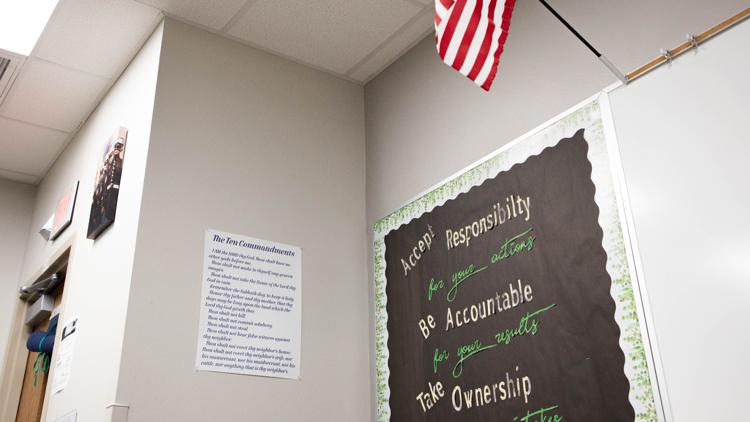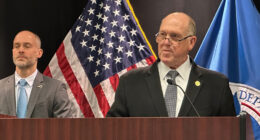Share this @internewscast.com

The law requiring the displays takes effect Sept. 1, but tens of thousands of posters are on their way to districts across the state.
FRISCO, Texas — Frisco ISD has more than 4,000 classrooms across 77 campuses.
Their first day of school is Wednesday.
And a copy of the Ten Commandments will be hanging in every class.
The district spent $1,800 on posters that comply with Senate Bill 10, even though the law does not require schools to purchase posters.
It only requires schools to display posters that are donated.
And with the law officially taking effect Sept. 1, nonprofit organizations are now coordinating efforts to get donated posters in every class.
“Our priority was ensuring that we’re able to use private donations to benefit school districts without imposing funding burdens on them,” explained Jonathan Covey, Director of Policy for Texas Values.
Texas Values is a faith-based conservative nonprofit that is partnering with a coalition of other organizations to coordinate the donations.
Donors can adopt a classroom or campus and choose where to have the posters delivered.
Covey said about 42,000 classrooms had been adopted as of last week.
According to the website tracking these contributions, over 90,000 posters have either been delivered to classrooms or are on their way to schools across Texas.
State Senator Phil King, R-Weatherford, who sponsored the legislation, informed WFAA on Monday that several state senators are actively fundraising and purchasing the posters themselves.
He said he spent about $7,500 buying posters for every classroom in his eight-county district.
He hopes they are delivered before or around Sept. 1.
But the ACLU of Texas is hoping the law doesn’t take effect.
The group represents several Texas parents suing the districts where their children attend school claiming the law violates their rights.
A hearing is set for Friday.
“We firmly believe our argument that SB 10 infringes upon our clients’ First Amendment rights is strong,” stated Chloe Kempf, a staff attorney with the ACLU of Texas. “Our goal is to stop this law from being enforced in our clients’ school districts before it takes effect.”
Covey said he feels like SB 10 is “in a very solid place legally.”
The law specifies the size of the posters and the type of material they must be printed on.
It stipulates that the posters be made of a durable material and it explicitly spells out what the text must say.
The version of the Ten Commandments it requires is most closely aligned with the Protestant faith.
King said that is identical to the Ten Commandment monument on the grounds of the Texas Capitol.
That monument has already been challenged at the U.S. Supreme Court. Texas prevailed.
“I fully anticipate the Texas courts will uphold this legislation as constitutional, and we are determined to continue our advocacy,” remarked Covey.
The law also specifies that the posters can only show text.
In Montgomery County, a nonprofit donated posters that included images of crosses to local districts.
“I missed the line about ‘no other content,’” said Rebecca Smith-Nash, founder and CEO of Love Heals Youth.
She has since redistributed those non-compliant posters to churches and private schools and plans to deliver new posters that comply with SB 10’s requirements to local public schools this week.
The law passed during the regular legislative session despite intense disagreement among lawmakers.
Clips from the debate went viral, with State. Rep. James Talarico, D-Round Rock, declaring he was voting against it not despite his faith but because of it.
“This is a power play,” he said. “By using our power as legislators to elevate our faith tradition over all the rest – that’s the kind of stuff that gives us Christians a bad name.”
Talarico is a seminary student.
While he argued the bill erodes the “sacred boundary” of church and state, supporters say the Ten Commandments are the historic basis for America’s legal and justice systems.
“We just want to make sure that kids have everything they need as they grow. They cry out a lot of times for moral clarity because we’re in very uncertain times. I think the Ten Commandments is an important piece of our history,” Covey said.

















